MIEM Seniors Present Their Projects at January Poster Session
In 2018, MIEM became HSE University’s first department to officially introduce project work to its curriculum. Students choose their projects in September and present them in poster form in January. The January poster session serves as an interim evaluation mechanism before student present their final versions of their projects before an expert jury in May and June.
Poster presentations mark the midpoint of students’ project work. Students present their interim results, speak about the challenges they’re facing, and discuss their solutions with teachers and industry professionals.
According to Evgenii Krouk, Academic Supervisor and Acting Director of HSE MIEM HSE, the final project should include a visible result. ‘Project work means that there is a technical specification and a visible result. If there is no result, the project has not been implemented,’ Evgenii Krouk said. ‘This doesn’t mean that people automatically fail. There is no single correct answer, and each solution has its advantages and disadvantages. And during the project defense process, the students must not only to demonstrate a working programme or device, but justify their solution. This way, we are simulating real-life work.’
For future engineers, project-based learning is particularly important, since it helps them gain experience in different areas involving both hard skills (such as documentation, programming, and prototyping) and soft skills (such as team work and presenting a project to clients. According to Evgenii Krouk, last September, about 100 projects were proposed. ‘We launched 86 of them. It was quite hard, since we had to find clients in the industry, or at least coordinators. This year, we already have 168 of them.’
For some participants, this is their second project: some current fourth-year students defended projects last year and decided to take on new projects this year in different fields.
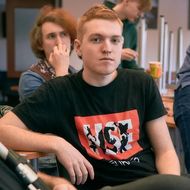
Alexander Tonkov, third-year student, Informatics and Computer Hardware and Software
Project: ‘Developing a process controller for a complex ventilation system for several rooms’
We are developing a multi-device system for creating a comfortable indoor climate. This is how it works: the data on temperature, humidity, carbon oxide levels, and the number of people in the room are delivered to the main microcontroller. The system processes this information and delivers more or less air from the outside. Our development helps ventilate all the rooms automatically and brings the temperature and humidity to optimal levels with the use of a heater and a humidifier.
We have already programmed the server part and an Android app, which allows the system to be controlled in manual mode. We have also developed a layout of a mount that imitates several rooms. At our project defense process in spring, we will use it to demonstrate the system operability.
First, this project solves an existing problem of regular ventilation systems, which often fail to effectively extract the processed air. I myself have often noticed rooms with built-in ventilation are still too stuffy, which hampers people’s attention span and productivity. Second, I wanted to see how microcontrollers work and are programmed, since, previously, I preferred to work with simpler Arduino parts.
It’s easy for us to work in a team: we have known each other since our first year at university, we get on well with each other and can solve the key tasks together. Project supervisor Vladimir Kulygin and academic supervisor Sergey Polesskiy also help us.
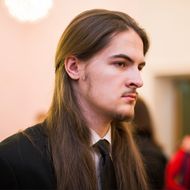
Artem Pivko, fourth-year student, Informatics and Computer Hardware and Software
Project: ‘Developing a system of VR visualization for a data centre’
Today, data centres are monitored by using either text tables or 2D diagrams. It is not very convenient: it’s hard to understand and it takes a lot of space, which leads to the use of multiple monitors. We are creating a system that will output the data from the data centre monitoring system in virtual reality. This will optimize the process: instead of a dozen of monitors, we’ll be able to use one computer and one virtual reality headset. Our project will result in a precise 3D model of the data centre venue, to which we will apply data in one form or another. At the poster session, we demonstrated a working prototype of our model, and we are going to demonstrate it to our client to elaborate the technical specification.
I have always been interested in virtual reality. Last year, I was involved with it as well, but as part of a big project team. I got some interesting experience working on a large team.
In our work, we get help from our academic supervisor Alexey Rolich and our computer networks instructor Alexander Ovchinnikov. We also get a lot of information from the internet.

Artem Nikitin, third-year student, Applied Mathematics
Project: ‘Developing a cross-platform game on the Unity platform’
We are developing a mobile game on the Unity platform. Last year, we wanted to try to do something with gaming development, and gradually, our concept evolved. Our game is a combination of cool features from our favourite popular games, our personal experience, and our own ideas. We’ve decided to implement this game as a project.
This has been our first serious experience of this kind, and I believe, we are doing well. In our work, we have to pay attention to every detail, since everything is closely interrelated. Take the code, for example: it can be programmed really well, but without a nice interface, no one would want to play our product; and on the other hand, if we create a visual masterpiece, we cannot avoid thinking about the relevant functionality, otherwise our work would be worthless.
It seems like the game turns out to look a lot like our team: it combines different aspects that make it a nice thing, and we work together taking advantage of each of us’ strong sides. We are pooling our efforts to create a game that would please not only someone else, but ourselves. Of course, we are continually modifying out project: we are reconsidering some of the mechanisms and are adding new features. The result will be different from what we initially planned, but I believe these changes are for the better: our team will make sure to do our best and make it perfect.
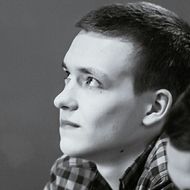
Artem Katsevalov, third-year student, Informatics and Computer Hardware and Software
Project: ‘Developing an interactive software complex based on a touch screen kiosk’
Since its opening, the MIEM building has had touch screen kiosks aimed at helping students, teachers and visitors to get around and get necessary information. But they are still not functional. Our team decided to develop software for them, which would be convenient and safe.
At first, we asked the students and teachers about what information they would like to be able to see on the kiosks. We carried out a survey, and based on the results, decided to develop features that help people with things such as navigating the complex, scheduling, finding available classrooms, viewing the day’s cafeteria menu (including the day’s lunch special), and learning the latest faculty news. For example, if you want to see how to get to a certain classroom, the system will demonstrate your way on the building scheme with the help of animation and text prompts, but without any sounds, and the schedule will look very similar to what everyone is used to in the RUZ system and HSE App.
Today, we are moving towards completion of the project, but the workload is only growing. We have to trial and fix a lot, and we have found out that this is the most resource-consuming part. But we will do it.
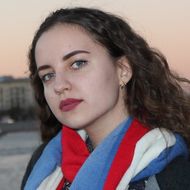
Daria Kandalina, third-year student, Applied Mathematics
Project: ‘Smart Medicine’
We are creating a user-friendly special software for doctors and medics, which helps to easily analyze health indicators. Our team consists of five people. First, we had to understand the methods we are going to implement in the software, and to prepare detailed descriptions for the doctors. The key advantage of our software is an elaborated chain of recommendations on the sequence of steps to make in the analysis, and help in interpreting the results when the final tables and graphs are ready.
We are continuing to work on the project: the ‘multiple regression’ module has already been implemented and returns correct data, but it still has to be finalized. Then, we will develop an interface for medical tests. As a result, we hope to implement it as a fully functional programme. And of course, in the future, we can expand the product’s functionality and develop it in terms of usability and compliance with the new trends on the IT market.
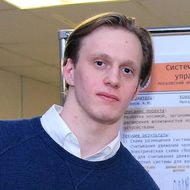
Vitaly Stepanyants, third-year student, Information and Communication Technologies and Systems
Project: ‘Robot Remote Control System’
The four of us are developing a portable system for reading human movements. It will be possible to use the received data in robot control systems and robot teaching. Special programs will have to be developed for each application, while the hardware part of the system will stay the same.
From the very beginning, we had to read and analyze a lot of information in order to understand where to go—we had had no experience of development. Before the project defense, we’ll have to develop a lot: a model of the indicators’ installation and binding, an electric circuit for data collection and system power supply, software for data collection and their preparation to be sent to the controlled object, API for remote control of the robot, and NAO for demonstrating the system operations. Currently, we are finishing the software development stage for data operation.
HSE News Service is grateful to first-year MIEM students Irina Taraskina, Valeria Nemna, and Polina Podkopaeva for their assistance in preparing the article.
See also:
Scientarium: Integrating Student Scientific Associations and HSE University Projects
In early July, the Voronovo Study Centre hosted Scientarium, an off-site session for representatives of HSE University student research communities organised by the university’s Centre for Student Academic Development and Unit for the Popularisation of Science. More than 50 students from 10 scientific student associations and three campuses took part.
From Ingenious Fungi to Post-feminism: HSE University Hosts Season’s Last Science Battles Semi-Final
Season VI of Science Battles at HSE University is entering the homestretch. The June semi-final determined the list of finalists and helped many viewers choose their favourites. This time, young researchers decided to figure out how to conduct a police lineup without destroying a person’s life, as well as how to improve a child’s academic performance without instilling neurotic perfectionism. They also found out that fungi and mould help heal scars and save the environment, and that adherents of post-feminism have very mixed feelings about their own images on TikTok.
Smart Medicine, Libration Points and Electromyographic Bracelets: MIEM Students Present Their Projects
In February, a two-day poster session - the second checkpoint of the project life cycle - was held at the HSE MIEM. The participants prepared colorful posters, talked with experts and MIEM students and received well-deserved plaudits. Here, the HSE News Service looks at some student projects.
Submarine and French Confectioner's Shop—Winners of the Top Class Research Competition Announced
This year’s final stage of Top Class, the All-Russian Competition of Schoolchildren’s Research and Projects, held by HSE University, has come to a close. About a thousand 8th—11th graders from 7 countries and 69 regions of Russia participated in the contest. The winners and runners-up were announced at the closing ceremony in the HSE Cultural Centre. They received special prizes from partner companies.
Winning Research Initiative Projects to be Implemented by the End of 2022
In April, the results of the Research Initiative student project competition were announced at HSE University. Twenty-two team applications were submitted by students of 20 different fields of study at HSE University’s campuses in Moscow, Perm, and Nizhny Novgorod. Based on the results of expert assessment, the competition committee approved 17 interdisciplinary projects to be implemented by December 2022.
HSE University Holds School of Snow in Perm Region
On February 15–17, the Winter SOS (School of Snow) was held at the Zhebrei ski resort. The event was organised by the HSE Perm Tourist Club and the Student and Alumni Centre. In addition to learning to ski and snowboard, students from all HSE University campuses developed and defended projects focused on the development of domestic tourism in their regions. SOS participants shared their impressions with the HSE News Service.
Registration Opens for ‘Research Initiative’ Team Project Competition
The HSE Centre for Student Academic Development has started accepting applications for the third ‘Research Initiative’ student team research project competition. Bachelor’s and master’s students from all HSE campuses are eligible to participate. The competition gives students an opportunity to not only take on research roles, but also to try their hand at working as academic managers and supervisors of a small research team. Registration will remain open until February 28.
HSE Master’s Students on the Professions of the Future
Students in the Transmedia Production in Digital Industries Master’s programme have done a project on the professions of the future. Covering trends and key professions, the project helps students assess potential academic trajectories. The main part of the project is a non-fiction book ‘What’s Next? Professions of the Future’, which is based on the ‘Androids and Electric Sheep’ podcast by Forbes and X5 Group. The book has been published on the Ridero platform.
‘Our Distinction Is Our Core Areas of Research’
In his interview for the HSE LooK, Evgenii A. Krouk, the Acting Director of HSE Tikhonov Moscow Institute of Electronics and Mathematics, talks about the distinctive features that set the institute apart, the place of project-based learning on the curriculum, research areas with the highest potential, and his vision for HSE MIEM future development.
Gifts under the Christmas Tree: How Student Startups Can Surprise You
One of the most popular minors that HSE University students can choose in their second and third years is 'Startup from Scratch'. With the teachers’ support, students launch their own business projects, including startups for the production and sale of souvenirs and cosmetics, which can serve as unique New Year gifts.


